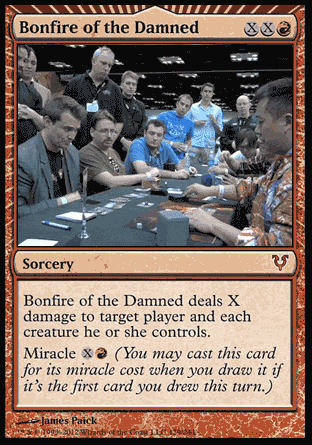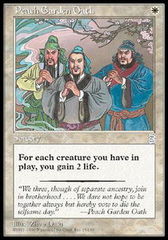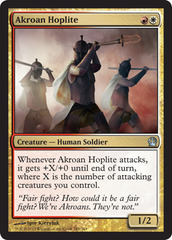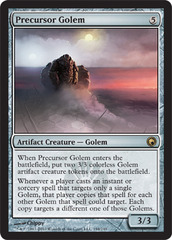Triple Strike

For any of you who haven’t experienced a team Magic event, where have you been all these years?

Team Magic is possibly the best way to play – it has a “Wow” factor to it, a Je-ne-sais-crois about collaborating, winning and losing as a unit. There’s nothing as tense and thrilling as six players huddling around the last active match in the deciding game, held breath released in exultation or exasperation to each draw step. I can’t recommend it enough – even a disastrous day of Magic is a hoot amongst friends.
So, now that I’ve piqued your interest and you’ve wrangled two friends into buying plane tickets to Madrid for the next Grand Prix, all that remains is the critical question – “What do we play?”. Now, that one’s a tad trickier than booking an Airbnb. Team Modern is a Unified Team Constructed format, meaning simply that if a non-basic card appears in any player’s deck, that card cannot be played by either of their teammates. Luckily, Modern is a wide open format with dozens of competitive decks, so you ought to be able to find something to suit all your fancies.
Where to start? There’s a number of approaches to this, but as I’ve said before, Magic is a game driven by the mana, and Modern is no exception. Modern’s fetch-shock mana bases are a cornerstone of the format, and many decks won’t be able to stomach sharing. An easy way to break this down is to look at the types of lands that decks in Modern play:
Elves, Merfolk, Soul Sisters, White Death & Taxes… – Basics + Utility lands (Ghost Quarter etc)
Affinity, Lantern – Glimmervoid + Spire of Industry
Three colour decks (Death’s Shadow, Jund etc.), Dredge, Scapeshift – Fetch/Shock lands
Eldrazi Tron/Tron – Tron lands + Utility lands
Ad Nauseum – Temples + Fastlands
Humans – Cavern of Souls + Unclaimed Territory + Ancient Ziggurat
At a basic level, with the exception of decks sharing Cavern of Souls, you should be able to select any three of these “land archetypes” and be good to go. Especially in the case of the monocolour decks, you gain some significant freedom amongst your other decks by selecting one of these, as you’re less likely to battle over critical removal spells and sideboard cards. Delving a little deeper, we can look at just how critical some of these lands are to these decks. Often it’s possible to move around the distribution of fetches with minimal impact, for example while Burn and Scapeshift will usually want to share Wooded Foothills, in actuality only Scapeshift relies on being able to fetch basic Forest and Mountain, whereas Burn only needs to be able to fetch Mountains, allowing you to move to a combination of Scalding Tarn, Bloodstained Mire and Arid Mesa. The crunch point here is the single copy of Stomping Ground that appears in the Burn list for sideboard Destructive Revelry, however it’s easy enough to move to a RW version and play Smash to Smithereens instead if you’re set on playing these decks alongside one another.
Another approach is to analyse Modern’s most powerful cards and try to select decks to maximise appearances from as many of these as possible. I think that no matter how you make your list, Mox Opal should be in the top 10. Free mana is always the most busted thing to be doing, and it doesn’t get much better than Mox Opal. This card is the backbone of two of the format’s most powerful strategies, Lantern and Affinity. In a team event, many teams will choose to play what they know – a wise idea in general, but you have to be careful that it doesn’t come at the cost of battling with your friend for cards. Fielding two white decks at the same table will mean only one player has access to Stony Silence – if your opponents are making concessions like these it will give what are arguably some of the best decks in the field (Affinity, Lantern) an even greater edge.
Most important of all is to make sure you’re comfortable. There are no byes at a team Grand Prix, so you’ve got nine rounds ahead of you on Day 1. If you’ve picked up a deck or style that doesn’t suit you you’re doomed to either fail, or have to lean on your teammates so heavily that you’re likely to distract them or cause them to time out. There are tonnes of combinations which don’t overlap a single card, and another many still that only require minor concessions to downgrades, e.g. swapping an Ancient Grudge for a Shatterstorm. Modern as a format encourages being well practiced with a single deck or archetype and knowing your matchups well.

Some umm-ing and ahh-ing later, the three of you have put your noggins together and selected your weapons of choice. Your penultimate challenge lies before you – who is going to sit where? There are a number of schools of thought on this, and depending on your play style as a team it may have little to no impact, or change the course of your tournament completely.
As a note, be aware that you are allowed to move around your table once you’ve completed your match at your seat. The judges won’t permit you to walk away from the table and return to your friends, for fear of you having seen your opponents’ hands or gained some outside assistance. However, as long as you stay in your chair, you can shuffle around to sit next to one of your teammates to spectate or provide assistance.
However, during the course of play the players must remain in their seats, making it difficult for the players in seats A and C to communicate and assist one another. So to start, you have to decide – do we have a single complex deck with a player who would do well with some support – in which case put them in seat B so they can consult with both other players. Otherwise do we have two decks with players who would appreciate support, in which case put the player with the simplest deck in the middle so that they can lend support to either side. It follows as well that if you have decks which tend to take a long time in their games, they will be less likely to be able to lend support as they risk running out of time in the round, or having their train of thought interrupted – putting this player in the middle as the support for seats A and C is likely to be a mistake, as you deprive A and C from communicating with one another, whilst also putting B at risk of distraction.
To take a working example, let’s say you’ve avoided overlap by selecting Elves, Affinity and Jeskai Control. The Jeskai player is likely to have the longest games, as the player with Logic Knot and the sort in their deck, and Elves decks, while explosive, can slow down a lot post-board against interactive decks and settle in for a CoCo/Lead the Stampede fuelled grind. Affinity games tend to be fairly one-sided and quick, for better or for worse. Putting the Affinity player in the middle can let them ask for their teammates’ opinions on sequencing the opening turns, if needed, and once they’ve finished their shorter match, lend help to both of the active players.

It has been said of playing a team event that one should only lean on their teammates for support when necessary. This will vary from team to team and even match to match, depending on your comfort levels with the format, your decks, and what you come up against, but the theory goes that you save questions for the important decisions. Your friends also have a match of Magic to win, so distracting them and borrowing their mental energy is a real cost. Lean on them as you need, but try to minimise it for the crucial decisions – remember, they have nine rounds to play too. Never be afraid to ask for help, but put yourself in their shoes before you do.
One thing to bear in mind when you reach out for advice is that it’s not gospel. Your teammates will be dipping their toe in the water and analysing the information in front of them, but they won’t immediately understand the way that you or your opponent has played the game, what you or they have been representing or playing around, and they may not understand your deck or the matchup in as much detail as you. Take advice where it’s given, but don’t be afraid to go against the grain if you have a strong conviction to the contrary. The player in the best position to make a judgement call on a game will always be the one who’s been playing it out.

Last, but not least, don’t forget to have fun! Win as a team, lose as a team – never give way to frustration and snap at your teammates. If you ever need any perspective, Jacob Wilson and his team took the trophy at GP Detroit 2014 with Wilson only winning a single match in sixteen rounds. Odds are, your friends are probably just following his example.





